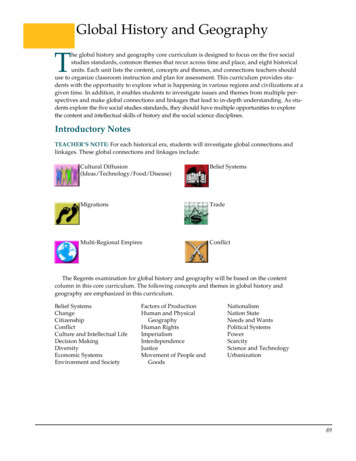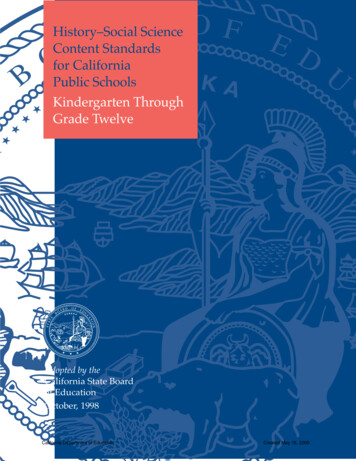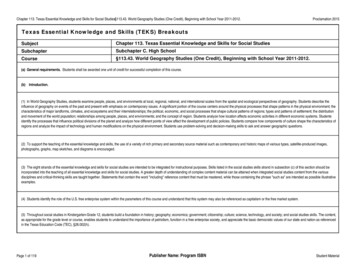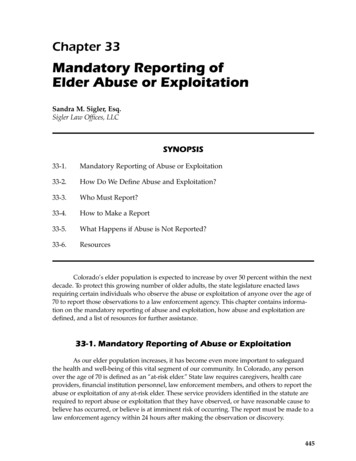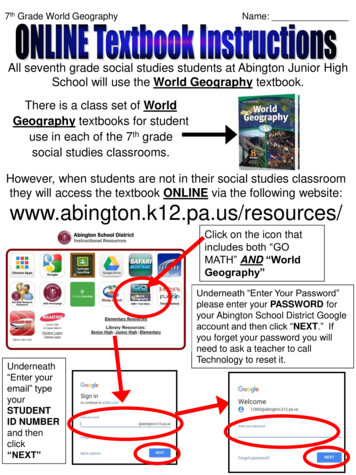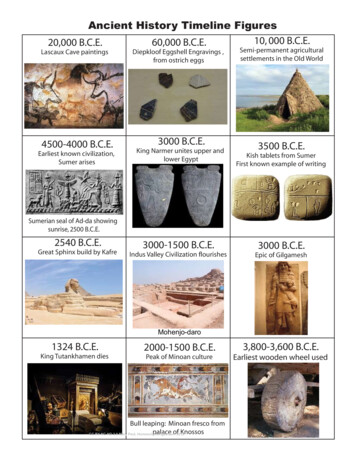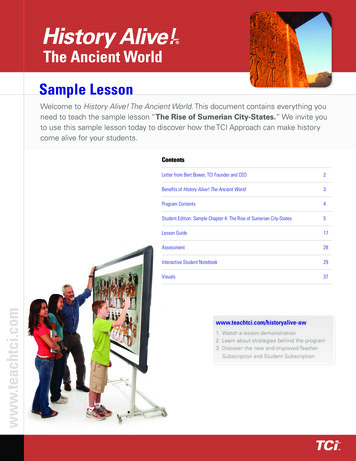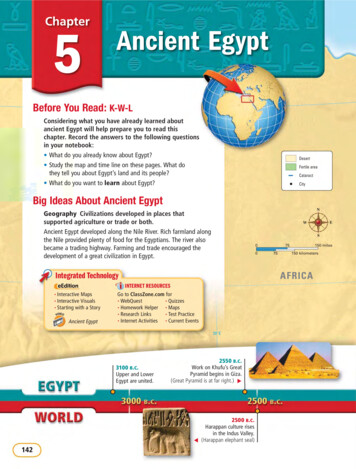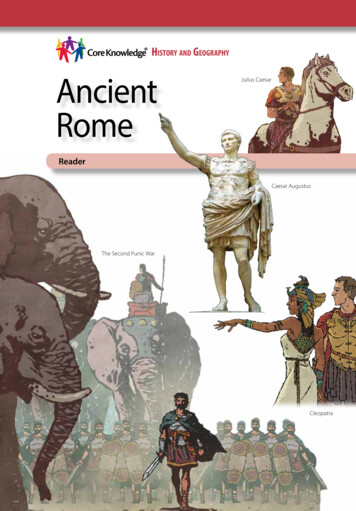
Transcription
History and GeographyAncientRomeJulius CaesarReaderCaesar AugustusThe Second Punic WarCleopatra
THIS BOOK IS THE PROPERTY OF:STATEBook No.PROVINCEEnter informationin spacesto the left asinstructed.COUNTYPARISHSCHOOL DISTRICTOTHERISSUED TOYearUsedCONDITIONISSUEDRETURNEDPUPILS to whom this textbook is issued must not write on any page or markany part of it in any way, consumable textbooks excepted.1. T eachers should see that the pupil’s name is clearly written in ink in thespaces above in every book issued.2. The following terms should be used in recording the condition of thebook:New; Good; Fair; Poor; Bad.
AncientRomeReader
Creative Commons LicensingThis work is licensed under aCreative Commons Attribution-NonCommercial-ShareAlike4.0 International License.You are free:to Share—to copy, distribute, and transmit the workto Remix—to adapt the workUnder the following conditions:Attribution—You must attribute the work in thefollowing manner:This work is based on an original work of the CoreKnowledge Foundation (www.coreknowledge.org) madeavailable through licensing under a Creative CommonsAttribution-NonCommercial-ShareAlike 4.0 InternationalLicense. This does not in any way imply that the CoreKnowledge Foundation endorses this work.Noncommercial—You may not use this work forcommercial purposes.Share Alike—If you alter, transform, or build upon this work,you may distribute the resulting work only under the same orsimilar license to this one.With the understanding that:For any reuse or distribution, you must make clear toothers the license terms of this work. The best way todo this is with a link to this web /4.0/All Rights Reserved.Core Knowledge , Core Knowledge Curriculum Series ,Core Knowledge History and Geography and CKHG are trademarks of the Core Knowledge Foundation.Trademarks and trade names are shown in this bookstrictly for illustrative and educational purposes and arethe property of their respective owners. References hereinshould not be regarded as affecting the validity of saidtrademarks and trade names.ISBN: 978-1-68380-012-5Copyright 2017 Core Knowledge Foundationwww.coreknowledge.org
Ancient RomeTable of ContentsChapter 1Romulus and Remus. . . . . . . . . . . . . . . . . . . . . . . . . . . . . . . 2Chapter 2Roman Gods and Goddesses. . . . . . . . . . . . . . . . . . . . . 8Chapter 3The Roman Republic . . . . . . . . . . . . . . . . . . . . . . . . . . . . . 14Chapter 4The Punic Wars . . . . . . . . . . . . . . . . . . . . . . . . . . . . . . . . . . . . 22Chapter 5Julius Caesar. . . . . . . . . . . . . . . . . . . . . . . . . . . . . . . . . . . . . . . 28Chapter 6Cleopatra, Queen of Egypt. . . . . . . . . . . . . . . . . . . . . . 34Chapter 7Julius Caesar Dies. . . . . . . . . . . . . . . . . . . . . . . . . . . . . . . . . 38Chapter 8Caesar Augustus . . . . . . . . . . . . . . . . . . . . . . . . . . . . . . . . . . 44Chapter 9Roman Lands . . . . . . . . . . . . . . . . . . . . . . . . . . . . . . . . . . . . . . 50Chapter 10 Roads, Bridges, and Aqueducts . . . . . . . . . . . . . . . . 56Chapter 11 The Buildings of Rome . . . . . . . . . . . . . . . . . . . . . . . . . . . 62Chapter 12 Gladiators and Chariot Races . . . . . . . . . . . . . . . . . . . 68Chapter 13 Pompeii. . . . . . . . . . . . . . . . . . . . . . . . . . . . . . . . . . . . . . . . . . . . . 76Chapter 14 The Romans and the Christians . . . . . . . . . . . . . . . . 84Chapter 15 The Decline of the Roman Empire . . . . . . . . . . . . . 90Chapter 16 East and West. . . . . . . . . . . . . . . . . . . . . . . . . . . . . . . . . . . . . . 96Glossary. . . . . . . . . . . . . . . . . . . . . . . . . . . . . . . . . . . . . . . . . . . . . . . . . . . . . . 102
Ancient RomeReaderCore Knowledge History and Geography
Chapter 1Romulus and RemusNow and Then Today, the city ofThe Big QuestionRome is the capital of a countryAccording to legend,called Italy. Two thousand yearshow did the city ofago, Rome wasRome begin?Vocabularythe center of thecapital, n. the mainworld’s greatest empire—the Romancity of a country andEmpire. The Romans ruled all thethe home of thecountry’s governmentlands around the Mediterranean Sea.legend, n. an old,well-known story,usually moreentertaining thantruthful2How did this great empire begin? The Romanshad a story, or legend, that explained this.
In Roman legend, twins Romulus and Remus were set adriftin a basket in the Tiber River.3
The Legend of Romulus and RemusMars, the Roman god of war, had twin sons named Romulus andRemus. When the twins were born, Mars promised that they wouldsomeday start a great empire.A jealous uncle kidnapped the baby boys. He asked a servantto drown them in the Tiber River. The servant took pity on theboys. Instead of drowning them, he put them in a reed basket.He placed the basket in the river.The twin boys were lucky. As the basket floated down the river, itdrifted toward the riverbank. The basket hit the riverbank, and Romulusand Remus fell out. Then something moved in the bushes near theshore. It was a mother wolf! She had heard the babies crying. Shenudged them with her nose and then with her paw. The wolf saw thatthe twins were hungry. She fed them milk just as she fed her own cubs.In the legend, a mother wolf found Romulus and Remus.4
Later, a shepherd found the boys and raised them as his own sons.After the boys grew up, they decided to build a city near the TiberRiver where the wolf had found them.The brothers began to argue. They fought over where to startbuilding the city. During this fight, Romulus killed Remus. Romulusbecame the first king of the city, which would be named afterhim—Rome.Romulus ruled Rome for many years, until he disappeared duringa storm. The Romans believed that his father, the god Mars, tookRomulus into heaven. There, Romulus became a god too.Romulus and Remus fought over where to build their city.5
The Early YearsThe story of Romulus and Remus is a legend. Legends usually arenot true stories. Rome was built near the Tiber River, but probablynot because a wolf helped twins there. So what really happened?Rome probably began when some farmers and shepherds built avillage of small huts on one of the seven hills near the Tiber River.These people probably settled by the Tiber because it was a goodplace to live. The soil was rich. There was plenty of water, and theriver was good for travel. An island in the river near the villagemade crossing the river easier.The seven hills around the Tiber made it hard for enemies toattack. Rome grew as more people settled on those hills. That iswhy Rome became known as the “City of Seven Hills.”According to legend, Rome was founded in 753 BCE. The lettersBCE stand for “Before the Common Era.” The Common Era beganwhen Jesus Christ was born. So Rome was founded 753 yearsbefore the birth of Jesus. That means Rome is more than2,750 years old.For many years, kings ruled Rome. Overtime the kings became greedy for power. In509 BCE the Romans drove out their king.They decided not to trust anyone else tobe king. Instead, the Romans made theircity a republic. In a republic, people chooserepresentatives to rule for them.6Vocabularyking, n. a male rulerwho comes to powerby birth and whorules for liferepresentative, n.a person who speaksor acts for someoneelse
Roman Lands, About 130 BCEKeyLands controlled by RomeMajor cityNWEAdSriaTiber R.RometicaAegeTyrrhenianSeaSe0eaSanMediterranean Sea400 milesOver time, Rome came to control a large area around the Mediterranean Sea.Italian PeninsulaPo R.AdriaTiber R.ticSeaRomeTyrrhenianSea075 milesMediterranean SeaRome became an important city on the banks of the Tiber River.7
Chapter 2Roman Gods andGoddessesThe Mighty Gods The ancientThe Big QuestionRomans believed in many gods.does this storyThey believed that Whattellyouabout theVocabularygods controlledimportance of gods ingod, n. a being inthe lives of Romans?everything inthe shape of a manwho has the powernature: the wind,to affect nature orsun, rain, even earthquakes.people’s lives8
The Romans believed that the god Saturn controlled the harvest.9
The Romans believed their gods were veryinvolved in their lives. These gods haddifferent names than the Greek gods becausethe Romans spoke Latin, a different languagethan the Greeks spoke. The goddess Junowatched over Roman brides and theirmarriages. The god Mars decided which sideVocabularygoddess, n. a beingin the shape of awoman who has thepower to affect natureor people’s livesholy, adj. having to dowith a god or religionshould win a battle or lose a war.If a Roman farmer had a good crop, it was because the gods werepleased. If the same farmer had a bad crop, it meant the godswere angry. Because of this, the ancient Romans worried aboutangering their gods.Keeping the Holy Fire BurningFlavia was in a great hurry. She ran barefoot across the fields ofher family’s farm. “Please help me, Vesta,” she prayed. “Let me gethome before the holy fire goes out!”Flavia was worried. “Why do I talk so much?” She asked herself.“Why can’t I remember my job?”Flavia and her friend Meta had spent most of the morning washingclothes in a stream. They talked as they worked.Then Flavia remembered that she had not checked the holy fireof the goddess Vesta. She left the wet clothes with Meta and ranhome as fast as she could.Flavia’s mother usually kept Vesta’s fire burning. Today, though,her mother had gone to the market. At nine years old, Flavia was10
The Temple of Vesta was one of the many buildings in an area of Rome called the Forum.the oldest daughter. It became her job tokeep the holy fire burning at home, just asit did in the temple.The goddess Vesta watched over thesacred fire of every Roman home and theVocabularytemple, n. a buildingused for worshipsacred, adj. relatedto religion; holyfire of Rome itself. The Romans did not11
make statues of Vesta. Fire was her onlysymbol. The Romans worshiped Vesta atevery meal by throwing food into their fires.Flavia burst into the house. She rushed tothe fire. There she found just a few glowingembers. Quickly but carefully, she placedsome straw on the embers. She blew gentlyto bring the flames back to life. Soon thefire burned brightly once again.“Oh, thank you, Vesta!” Flavia cried. Sheplaced more twigs on the burning straw.When the twigs were blazing, she put someVocabularysymbol, n. a pictureor object that is asign for something;for example, theAmerican flag is asymbol of the UnitedStatesember, n. a smallpiece of burningwood or coal from adying firecharcoal, n. blackchunks made fromburned wood thatare used as a fuelcharcoal in the fire. Flavia and her familybelieved that the smell ofburning charcoal meantthat Vesta was watchingover the family.Flavia and her family feltvery close to Vesta and tothe god Janus (/jay*nuss/),who also watched overRoman homes. Janus wasa special god with twofaces: one in the front ofhis head and one in the12This Roman coin shows the god Janus. Januswatched over doorways and archways everywherein Rome.
back. With his two faces, Janus watched over the beginning andthe end of all things. He also watched who came in and who wentout of every building.Later, Flavia again thanked the gods that the holy flame had notdied out. If it had, her family would have been disgraced. She wasvery grateful that the gods had saved her. She promised them shewould never forget again.13
Chapter 3The Roman RepublicA Boy Visits Rome Lucius(/loo*shee*us/) dressed in thedark. Almost everyone in hisgrandfather’s villa, or countryhouse, was asleep. Only the peoplewho worked in the kitchen wereawake. They got up early every dayto prepare the morning meal.14The Big QuestionIn ancient Rome, whatwas the differencebetween patriciansand plebeians?
Some wealthy Romans lived in beautiful country villas.15
Lucius was about to try driving a chariot. It was a children’schariot, towed by a goat instead of a horse. Still, he wasvery excited.Lucius ran barefoot over the stone floorsof the villa. He carried his sandals until hereached the path through the outer garden.He put on his sandals and followed thepath to a long driveway.Vocabularychariot, n. a carriagewith two wheels thatwas pulled by horsesor other animalsSimon, a Greek servant who worked for Lucius’s family, waitedby the chariot holding the long reins. Simon was Lucius’s friendand teacher.“Go slowly until you reach the road,” Simon warned.Lucius gripped the reins. Healmost fell off when the chariotlurched forward. The chariotquickly reached full speed.Simon ran behind, shouting.It was a wild ride. Luciuseventually got the goat undercontrol. He was able to guidethe chariot in a large circle,back to the villa. There he sawSimon, looking embarrassed.He also saw his father,looking angry.16Lucius’s family
“Your mother better not hear of this, boy!” said Lucius’s father.“Simon, take this goat back to the field. Lucius, go inside and find awarm cape. We go to Rome today.”“Yes, Father,” said Lucius, and he ran to find his cape. Today hewould ride in his father’s chariot, too!Patricians and PlebeiansLucius was a patrician (/puh*trih*shun/).That meant that his family had greatwealth and power. His grandfather was aRoman senator. His father was an armycommander who had led a legion of fiveto six-thousand soldiers. The family villawas surrounded by a large farm. Hundredsof enslaved people worked on this farmmaking olive oil and wine. Lucius’s familysold the oil and wine in nearby Rome.Only a very few Roman families werepatricians. These families were verypowerful. They controlled the governmentand the army.What about ordinary Roman citizens?These people were called plebeians(/pleh*bee*uhnz/). Most plebeians werepoor working men and women.Early in the republic, the patricians hadalmost all of the power. They guarded theirVocabularypatrician, n. amember of ancientRome’s highestsocial class; a wealthylandowner in ancientRomesenator, n. amember of theSenate, the partricianlawmaking group inancient Romecitizen, n. a personwho belongs to acountry and hasprotections underthat country’s lawsplebeian, n. acommon personwithout power inancient Romerepublic, n. a kindof governmentwhere people electrepresentatives torule for them17
power and gave very little to the plebeians.The plebeians could make some laws intheir assembly, but the patrician Senatecontrolled the government. The Senatedecided how government money wasspent. It also decided who worked for thegovernment and when Rome would makewar and peace.Roman society was divided into different groups, with differentroles and powers.18Vocabularyassembly, n. agroup of people thatmakes lawsSenate, n. thepatrician lawmakinggroup in ancientRome; the mostpowerful group inthe Roman Republic
Each year two patricians were elected toserve as consuls. The consuls commandedthe army and made sure laws were carriedout. They also led meetings of the Senate.When Rome went to war, the consulssometimes chose a dictator to lead thecountry. The dictator had complete controlover Rome. Everyone had to do what he said.The dictator’s job was to make sure that Romewas safe and that the army got whateverit needed to win a war. Dictators had greatpower, but they were allowed to run RomeVocabularyconsul, n. the mostimportant official inthe Roman Republicdictator, n. a rulerwho has total controlover the countryForum, n. the area inthe center of Romewhere governmentbuildings, temples,and other importantmonuments werebuiltfor only six months.Lucius and his father arrived in Rome shortly after sunrise. Thecity was quite empty at that hour. They walked across the Forumin the center of Rome and found a place to sit. They watched asshops opened for the day and Romans crossed the Forum on theirway to work.Lucius Quinctius Cincinnatus“Lucius, this great city was built by people of honor,” his fathersaid. “They served Rome because it was their duty. They wantednothing for themselves. One of the greatest of these peoplewas Lucius Quinctius Cincinnatus (/loo*shee*us/qwin*shee*us/sin*sih*nae*tus/). You are named for him.19
“Cincinnatus had a small farm on the Tiber River not far fromthe city,” Lucius’s father continued. “One day, he was plowinghis fields when messengers came to him. They asked him togo with them to the Senate. Cincinnatus was covered with dirtfrom his work, but he put on his toga and crossed the Tiberto Rome.“When Cincinnatus reached the city, the senators said that he hadbeen chosen as dictator. They told him that an enemy force hadCincinnatus crossed the Tiber River.20
trapped the entire Roman army in a mountain pass. The armywould be destroyed unless help arrived soon.“Cincinnatus ordered every shop in the city to be closed. Heordered every man and boy in the city to meet in a field with hisweapons. Everyone was given a job, and soon they were ready tomarch. Cincinnatus led this citizen army to the rescue.“They saved the Roman army. The next day Cincinnatus returnedto the Senate. He told the senators that the army had beensaved. Then he returned to his farm.“This great Roman wanted nothing from Rome except a chanceto do his duty. That is why I named you Lucius. I want you toremember your duty as a Roman.”21
Chapter 4The Punic WarsThe Roman Army In its early days,The Big QuestionRome was a small city with a smallWhat bold attack didarmy. This army was made up ofHannibal make in theRoman citizens and included bothSecond Punic War?patricians and plebeians. It was a greathonor to be in the army and defend the city of Rome.Vocabularyconquer, v. to wincontrol of a landand its people byattacking an enemy orfighting a warpeninsula, n. a pieceof land sticking outinto a body of water,so that it is almostsurrounded by waternation, n. the landand people who liveunder the authority ofa government and itslaws; a country22The Romans fought some of their neighbors.When the Romans conquered an enemy,they took control of the land and peopleliving there. In time, the Roman armybecame large and powerful. By the year265 BCE, the army had conquered most ofthe Italian peninsula. In 264 BCE the Romanswent to war against Carthage. Carthagewas a powerful nation located across theMediterranean Sea on the coast of NorthAfrica. Today, the city of Tunis stands whereCarthage once stood.
Carthage was a powerful enemy of Rome.23
The Punic WarsThese wars against the Carthaginians (/kar*thuh*jin*ee*ans/) arecalled the Punic (/pue*nik/) Wars. The name comes from Latin,the language spoken by the Romans. The Latin word Punicusmeans Carthaginian. So, a Punic War is a war between Rome andCarthage. Since Rome and Carthage went to war three times,these wars are called the First, Second, and Third Punic Wars. Theywere fought between 264 and 146 BCE.The First Punic WarThe First Punic War was different from any war the Romans hadfought before. Carthage was a rich nation with a large navy. Whenthe First Punic War began, Carthage had five hundred fighting ships.Rome had no navy at all.The Romans were determined to win.They built warships and learned to fightat sea. They learned to fight in formation.They trained tens of thousands of sailorsto man their warships. They fought theVocabularyformation, n. anorderly arrangement,such as in rows or alineCarthaginians for twenty-three long years. When the First Punic Warended in 241 BCE, the Romans had won.HannibalAt the end of the First Punic War, a young Carthaginian boy namedHannibal waited for his father to return from battle. His father wasan important leader in the Carthaginian army. Hannibal wanted to24
be a soldier like his father.More than anything, hewanted to fight againstthe Romans.When Hannibal’s fatherreturned, he becamecommander of Carthage’sarmy. He then conqueredthe rich lands along theRoman soldiers trained to fight in formation.northwest coast of the Mediterranean. Today this area is called Spain.When he was nine years old, Hannibal went to Spain with hisfather and the army. Hannibal grew to be an excellent soldier,like his father. When he was twenty-six years old, Hannibal tookcommand of the Carthaginian army.Hannibal was a great general. He was brave and clever in battle.He treated his men fairly and earned their respect and loyalty.The Second Punic WarHannibal still wanted to fight Rome. In 219 BCE he attacked a townthat was friendly with Rome. This attack started the Second Punic War.Next, Hannibal decided to march his army from Spain to Italy. Thismeant crossing wide rivers and the tall snow-covered mountainsknown as the Alps.It would be hard for the soldiers to cross these rivers andmountains. Hannibal also had to get thousands of horses and25
Hannibal’s Route to Roman .ETiber R.SPAINPo R.AdriaBlack RICAAlpsLands controlled byRome, about 220 BCEHannibal’s routeMountainsMediterranean Sea0400 milesHannibal’s route from Spain to the lands of Romedozens of elephants across these barriers.The Carthaginian army used Africanelephants in battle. Most of their enemiesVocabularybarrier, n. somethingthat is in the wayin Europe had never seen elephants andwere terrified by them.The Romans thought that no army would ever be able to cross therugged Alps. They were wrong. The Carthaginians made it overthe Alps and onto the Italian peninsula. The crossing took fifteenhard days, and Hannibal lost almost half his men.Hannibal fought the Romans on the Italian peninsula for the nextsixteen years. He won great battles, but Romans would not give up.Eventually, the Romans sent an army to attack Carthage. Hannibalrushed home. Outside Carthage, Hannibal met a Roman army ledby General Scipio Africanus (/sip*ee*oeh/af*rih*kay*nus/). TheRoman army won the battle. Carthage surrendered, but Hannibal26
Roman legions feared the elephants when they first saw them.continued to fight. He moved from place to place, staying awayfrom the Romans. When the Romans finally trapped him, Hannibalrefused to surrender. Instead, he killed himself.The Third Punic WarAfter the Second Punic War, Rome and Carthage were at peace formore than fifty years. Then in 149 BCE, the Third Punic War began.The Romans sent a huge army to Africa. The fighting lasted onlythree years. In the end, the Romans destroyed the city of Carthage.The Carthaginians who were not killed were enslaved.27
Chapter 5Julius CaesarThe Roman Army The Romans weregreat conquerors. They had large,well-trained armies. Their navy ruledthe seas. After the Romans defeatedan enemy, the captured landbecame part of Rome.Vocabularyprovince, n. an areaor region; when anarea was conqueredby Rome, it becamea province underRoman controlgovernor, n.the leader of thegovernment in aprovincetax, n. money thatpeople pay to thegovernment28The Big QuestionWhy did someRomans think JuliusCaesar was a hero?These lands were called provinces. TheRoman Senate sent a governor to eachprovince. The governor made sure theprovince paid taxes to Rome. The Romansusually let the conquered people keep theirlaws and customs. Sometimes they even madethe conquered people citizens of Rome.
The Romans conquered lands that once were part of ancient Greece. They brought manyGreek statues and paintings back to Rome. They also brought Greek stories and plays andcopied Greek building styles.29
The Impact of Ancient GreeceThe Romans copiedthe Greeks becausethey admired thebeauty of Greekart, writings, andbuildings. WealthyRomans keptenslaved Greekservants who hadonce been teachersThe columns of the Roman Temple of Saturn were copiedfrom Greek architecture.and doctors. Many Romans learned the Greek language.Trouble in the RepublicAs Roman armies conquered more lands, the wealthiest Romansgrew richer. They used enslaved people to work on their land.Enslaved people were not paid for the work they did, such asfarming. As a result, rich farmers could sell their crops for lessmoney than farmers who had to pay workers. This gave richerfarmers a big advantage over other farmers. Many poor farmerswere forced out of business and lost their land.Many farmers who lost their land came to Rome. They were out ofwork and hungry. They wanted help from the Roman government. Butthe Senate controlled the government, and many senators were richlandowners. They did not care about helping the poor people of Rome.Several leaders told the Senate to help the people who had losttheir land. But the Senate did not listen.30
Unhappiness among the Roman people grew. The Roman Republicwas growing weak. In its final days, one man took control of thegovernment. His name was Julius Caesar (/jool*yus/see*zur/).Julius CaesarJulius Caesar was born in 100 BCE. Although his parents werepatricians, they were not very wealthy. Caesar knew he wouldhave to work hard to get ahead. As a young boy, he did well in hisstudies. He also did well at sports, especially horseback riding.Caesar served in the Roman army in Asia. When he returned toRome, he worked as a lawyer. He made friends with many peoplein the Roman government.Caesar was a great speaker and was chosen for severalgovernment jobs. One of his jobs was to manage the gamesand shows for the city of Rome. These shows helped amuse andentertain the people of Rome. Caesar borrowed money from hiswealthy friends. He used the money to make the greatest gamesand shows in Romanhistory. His gamesmade Caesar popularwith the peopleof Rome.Caesar becamefriends with powerfulleaders in the Senateand in the army. Oneof these friends wasEven as a young man, Julius Caesar had achieved manythings.31
Pompey (/pahm*pee/), Rome’s mostfamous general. Caesar also hadenemies in the Senate, especiallyamong the wealthy landowners.Caesar was elected consul in59 BCE. Then he became governorof two provinces next to an areacalled Gaul. Today we know thisarea as southern France andnorthern Italy.Julius Caesar was honored for this bravery.Caesar led a large Roman army into Gaul. The Gauls were fiercewarriors, but Caesar was an excellent general. His soldiers lovedhim. Caesar won many victories. His conquests in the Gallic Warsof 58–51 BCE made him a hero to many Romans.Crossing the RubiconCaesar’s old friend Pompey became jealous of Caesar. He watchedCaesar grow more powerful with each victory. Soon Pompey was nolonger Rome’s most famous general. Caesar was.Pompey joined Caesar’s enemies in theSenate. They hated and feared Caesar. Theythought he was too popular with the Romanpeople. His army had grown too powerful.The Senate ordered Caesar to give up hisVocabularyborder, n. animaginary line thatmarks the edge ofa country or otherpiece of landarmy and return to Rome.Caesar faced a hard choice. He led his army to the Rubicon(/roo*bih*kahn/) River, which was the border between Gaul32
and Italy. Caesar stopped and thoughtabout what to do next.If his army crossed the Rubicon, he wouldbe at war with Rome. But if he left hisVocabularycivil war, n. a warbetween peoplewho live in the samecountryarmy in Gaul, he would have no protectionagainst his enemies. They would probably kill him. Caesar decidedto fight. He led his army across the river and started a civil war.Civil WarThe war did not go well for Caesar’s enemies. Caesar drove them out ofItaly into Spain and finally to Greece. There, Caesar won a clear victory.After he won, Caesar forgave the senators who fought against him.Caesar’s old friend Pompey escaped. He went to Egypt, where theking had him killed. For the king, this proved to be a terrible mistake.Caesar crossed the Rubicon River and started a civil war in Rome.33
Chapter 6Cleopatra, Queen of EgyptArrival in Egypt In 48 BCE JuliusThe Big QuestionCaesar sailed along the Nile Riverdid Juliusand arrived in Alexandria, Egypt, with WhatCaesar do in order toa small group of soldiers. Caesar wasprotect Cleopatra?looking for Pompey. He went to theking’s palace. There he learned that Pompey was dead.The king of Egypt had trusted his advisers. They had promised him thatCaesar would be happy that Pompey was dead. They were wrong. Pompeywas a Roman general. Caesar saw Pompey’s murder as an insult to Rome.CleopatraWhile Caesar was still a guest at the palace, a servant entered carryinga large, rolled-up rug. Caesar watched as the rug was unrolled.Cleopatra (/klee*oe*pat*ruh/), the queen of Eygpt, was hiding inside.Cleopatra begged Caesar to protect her from her brother, the king.She said the king and his advisers were planning to murder her.It took a little while for Caesar to reply. He stared at Cleopatra andlistened to her voice. He would certainly protect her. He wanted tokeep the beautiful queen near. Cleopatra stayed with Caesar.34
Notice Cleopatra’s clothing and jewelry in this carving.35
The king and his advisers were angry that Cleopatra had outsmartedthem. They were also angry that Caesar agreed to protect Cleopatra.They ordered the Egyptian army to surround the palace. They thoughtthis would make Caesar change his mind. Once again, they were wrong.Caesar ordered the Roman army in nearby Syria to march on Alexandria.Caesar killed the king’s chief adviser. The Egyptian king fled from hisown palace. When the Roman army arrived, Caesar took command. Heeasily defeated the Egyptian army. The king of Egypt died in the battle.Cleopatra was very grateful to Caesar. Sheasked him to travel through Egypt with her.According to legend, th
world’s greatest empire—the Roman Empire. The Romans ruled all the lands around the Mediterranean Sea. How did this great empire begin? The Romans had a story, or legend, that explained this. 2 The Big Question According to legend, how did the city of Rome begin? Vocabulary c
